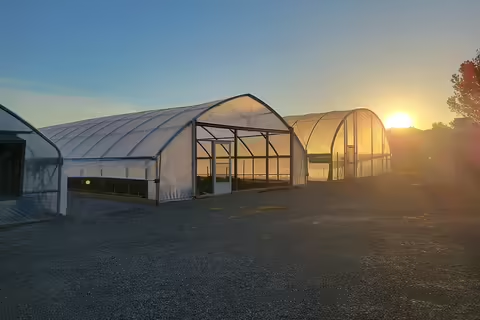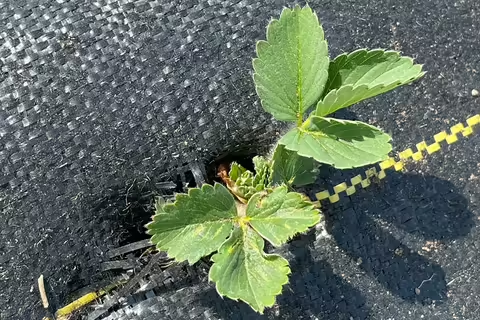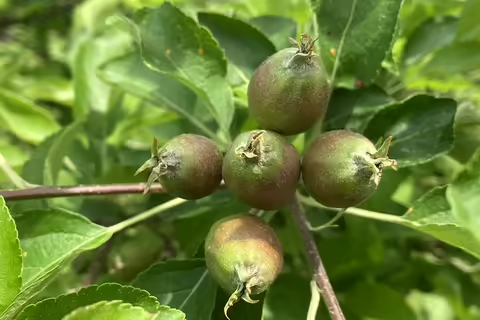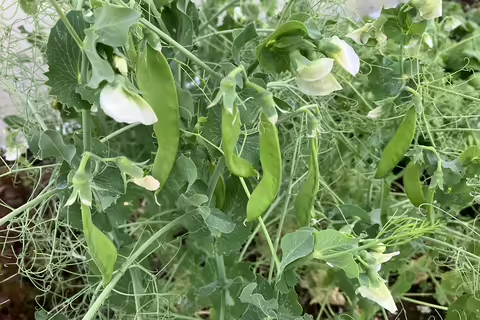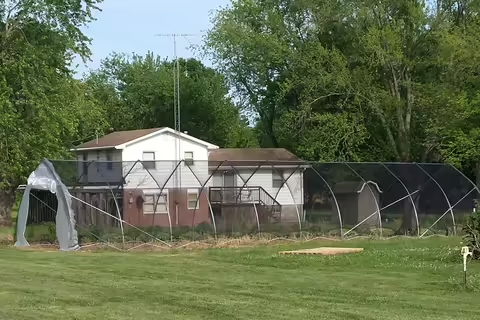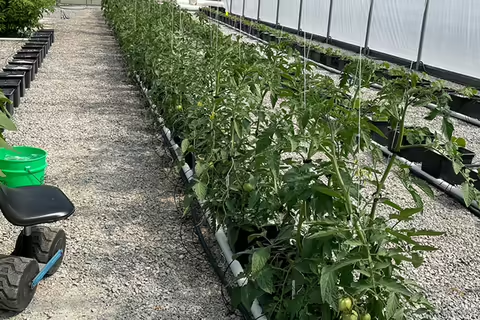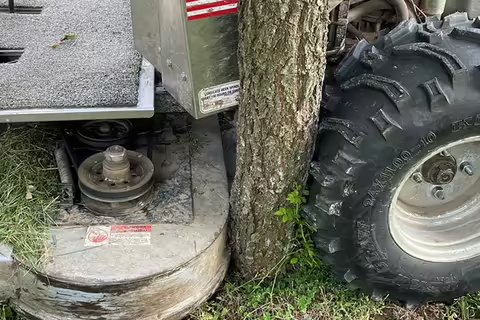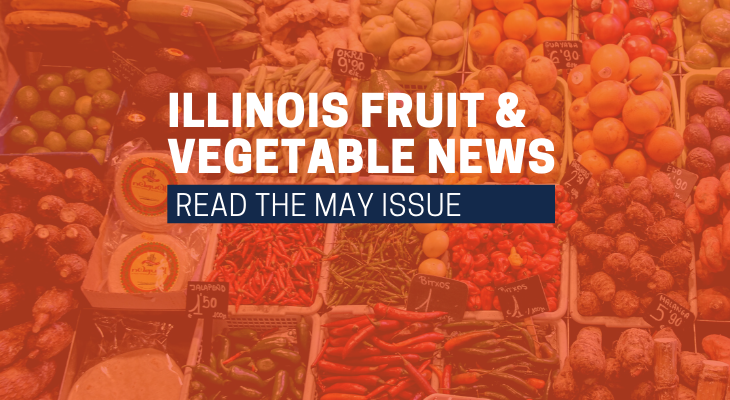
Illinois Summer Horticultural Field Day to be June 9
The Illinois State Horticultural Society is proud to announce the annual Summer Horticulture Field Day at Eckert’s Belleville Farm in Belleville.
The Eckert Family is proud to invite guests to tour their farm and agritainment operation on Thursday, June 9. The Eckerts have been growing apples for over 100 years in rural Illinois near St. Louis. Proud of their farming heritage and diligent stewards of the land, the Eckerts have cultivated and preserved their orchard business for eight generations.
Eckert’s Belleville Farm boasts a diverse offering of specialty crops including apples, peaches, strawberries, black raspberries, blackberries, vegetables, pumpkins, Christmas trees, and flowers. The family’s commitment to sustainable agriculture is apparent through all crops grown on the farm, and they will be highlighting their best-in-class management techniques they use to improve crop health, protection and yield.
The field tour, lead by Chris Eckert, will showcase many of their new growing practices in tree fruit including apples in super high density, summer hedging, graft over apples utilizing new varieties from the Midwest Apple Improvement Association, sunburn control with drape nets, insect and disease management, and more. We will also tour the other specialty crops on the farm with specialists in horticulture, plant pathology, entomology, and weed & pest management from the University of Illinois, Southern Illinois University and University of Illinois Extension as well as major industry supporters with new equipment, seed & nursery representatives, and other pertinent Agri-Industry members. For those not interested in the field tour, there will be a Farm Market session in their large Country Store to discuss their retail market & bakery.
Sign up today for a fun filled day of farm tours, educational talks, great food, and a chance to visit with vendors and friends both old and new! This event is sponsored by the Illinois State Horticultural Society, University of Illinois, and the Illinois Specialty Growers Association. Advance registration is $30 and includes lunch. Register online. For more information, email Jenna Spychal, Summer Hort Field Day coordinator, at jenna@jonamacorchard.com or call 217-254-5258.
High Tunnel Growers Needed for Research Collaboration
We are still on the lookout for high tunnel growers in Illinois interested in collaborating with a team of researchers working together to better understand the impacts of insect pests in high tunnel specialty crops production. We recognize that there is extraordinarily little available in the way of research-backed recommendations regarding what insect pests you can expect to experience on your high tunnel crops, how the environment in which you are growing and the crops that you are producing can impact these pest dynamics and what are the most effective and economically feasible management strategies. Our ultimate goal is to develop management recommendations for insect pests in high tunnel cropping systems that increase the sustainability of our local food supply.
Our team includes researchers and extension professionals from Purdue University, the University of Illinois, and the University of New Hampshire. We are doing on-farm research and are hoping to locate 20 high tunnel growers in each state that would be willing to let us assess their pest populations, measure the ambient conditions, and release natural enemies for pest suppression. If you are interested in participating, that would be wonderful. You need to have active tunnels in fruit or vegetable production. We are not picky about the crops you are growing, as long as they are specialty crops and we are looking for growers that have monocultures or polycultures as well as organic and conventional growers. If you would like to participate let me know. Email Kacie Athey, kathey@illinois.edu.
Kacie Athey (217-244-9916; kathey@illinois.edu)
Northern Illinois Regional Report
Spring seemed fairly short lived for growers in Northern Illinois as we moved from colder and very wet conditions to a period of very warm weather the week of May 9 before we return to normal spring temperatures this week. June-bearing strawberries are beginning to flower in some parts of the region. Orchards are working to thin some of their apple varieties. One of the observations I have made this spring is that while peaches are not recommended for commercial production this far north, those with small plantings have seen a delay in the flowering into May in which the peaches trees have avoided flowering during a wet-cold period of April which they commonly do. So for northern growers with peaches, we should expect to see a good (albeit small and non-commercial) crop this year.
This spring began the first year of a Day-Neutral strawberry varietal trial in Northern Illinois. Funded by a USDA Specialty Crops Block Grant, I am overseeing data collection of 3 different varieties (‘Seascape’, ‘Mara Des Bois’, and ‘Albion’) to determine their suitability for northern strawberry growers in an annual system. One of the great features of this project is that it is on-farm research at a strawberry u-pick/apple orchard in Jo Daviess county and a mixed vegetable CSA in Stephenson county. We’ll be incorporating the growers’ common practices in setting up and managing the strawberries this summer. We’ll be evaluating for labor, yields, flavor, pests, and many other management practices. Due to weather delays this year, the bare-root strawberries were planted the first week of May. I’ll have more to share throughout the summer on this project and hope to have valuable data/recommendations for attendees at our Stateline Fruit and Vegetable Growers Conference and IL Specialty Growers Conference in 2023.
Grant McCarty (815-235-4125; gmccarty@illinois.edu)
St. Louis Metro East Regional Report
Temperatures the first week of May were well below average, then everything changed to hot the second week of May. Daytime temperatures soared into the 90s with nighttime temperatures staying well into the seventies. It would not be unexpected to see some flower abortion in green beans and tomatoes after exposure to a few high nighttime temperatures that second week. This third week has been running just a bit above average from the upper 70s to mid-80s, with nighttime temperatures falling into the upper 50s and low 60s. Rainfall has been hit or miss, meaning some areas had to wait longer for rainfall to come than others.
Plasticulture strawberries are in harvest as well as asparagus and leafy greens. Blackberries and raspberries are in bloom, and peaches and apples are beginning to size. Knock on wood, everything looks good so far with the fruit crops. Several reports of cutworms and mites in field-grown tomatoes. Sweet corn planting is ongoing, as well as all other warm-season vegetables.
Everyone is invited to attend the Illinois State Horticulture Society Summer Horticulture Field Day being hosted at Eckert’s Belleville Farm on June 9. Registration opens at 8:00 am with the program beginning at 8:30 and running through lunch. Optional tours will be available from 1:30 to 3 p.m. Pre-registration is now available at $30 per person, and includes lunch. Registration at the door is $40 per person. Eckert’s Belleville Farm is located at 851 S. Greenmount Road, Belleville.
Elizabeth Wahle (618-344-4230; wahle@illinois.edu)
Southwestern Illinois Regional Report from Waterloo
May has brought us all kinds of weather so far. The second week of May was our week of summer with temperatures climbing rapidly into the 90s for highs. Since we have been more moderate, and within the last week have been fairly wet getting 2-4” of rain across multiple storm systems. As we start the fourth week of the month, we are actually cooler than normal with highs mainly in the upper 60s to 70 and lows in the 50s. Right now the soil is very wet and we have had quite a few clouds.
There was a good window of time to get some field work done in late-April and the first part of May. Lots of our warm season vegetables are in the ground. Growth was good with the warm weather, but things have slowed now with the cooler conditions. Blackberries are in full bloom, blueberries and cherries are set and fruit are sizing. Apples look good and most of the largest fruit are around ½ to ¾ inch in diameter. Asparagus and cool season spring crops did not appreciate the sudden 90° temperatures, but are more content with the current cool weather we are having. Early March plantings of peas now are about to the end of bloom.
It will be time to think about pumpkins very soon. I have a few notes on pumpkin weed management later in this issue but one thing I would stress is that as far as herbicide options. Preemergence is where we have the most available control especially for broadleaf weeds. I encourage growers to prioritize getting a PRE on any planting pumpkins. I always get calls of they got planted but didn’t get a PRE on and now the pumpkins are up… your options are very limited at that point.
It will be interesting to see what the rest of spring brings us!
Nathan Johanning (618-939-3434; njohann@illinois.edu)
Southern Illinois Regional Report from Murphysboro
The Jackson County office has been very busy during the month of May. We hosted a youth Ag Safety day in partnership with the Jackson County Farm bureau office. During the day, 159 local 4th grade elementary students learned about topics such as fire, chemical, and tractor safety. The day was a success thanks to all the volunteers and speakers.
The high tunnel is currently full of cut-flowers, tomatoes, cantaloupe and peppers. Like many others across the state, we are getting a late start planting outside due to the frequent rains we have been having. Cherry tomatoes were transplanted outside this past week, and we plan to trellis them over our archway in the garden.
Outside, we recently build a 14 by 50 ft caterpillar tunnel for a ginger variety trial for horticulture educator Chris Enroth. I want to thank Chris Enroth, Ken Johnson, Katie Parker, Mary Fischer, and Maggie Ray for being the building crew on our new cat tunnel. We decided not to put the plastic cover on the tunnel and only use the shade cloth during the summer, which will hopefully increase airflow and avoid some of the more extreme heat. Chris explained that while ginger is a tropical crop, it prefers steady warm humid temperatures and not the 90 degree plus swings that southern Illinois is known for. The five varieties in the trial will be replicated in the high tunnel as well.
I hope that everyone has a safe and happy growing season!
Katie Bell (618-687-1727; klbell@illinois.edu)
Dixon Springs Ag Center Regional Report
We really enjoyed the two days of spring weather we had a couple of weeks ago before the record setting +90o high humidity days kicked in last week. We did have about a week and half with no rainfall and farmers were able to get in the fields. As of last week, reported sweet corn planting had been delayed due to excess rainfall and the earliest planted patch was up maybe a couple of inches. Plasticutlure strawberry harvest is in full swing with what looks to be about a 3-3.5 week harvest window for Chandler vareity. Ideally with the right May temperatures, the harvest window would be spread across 6 weeks, but with the past week of unseasonably high temperatures, the crop is getting pushed hard and ripening rapidly, making for a short harvest season.
All of our high tunnel crops are growing really well, leaves are darkening up and plants are putting on a lot of new growth, a strong indicator of good nutrient uptake. We anticipate our first harvests to be a week or two behind our normal dates due to the delay in plant date (~April 13 instead of the typical April 1). We utilize a trellis weave system to support our determinate tomatoes and all of the plots have received the first and second strings and have been pruned or suckered to below first cluster. The indeterminate plots are suckered and trained to a single stem and clipped to individual strings attached to overhead support. The first fruit clusters of the ‘Arbason’ variety being grown hydroponically in the different substrate treatments (perlite, coco coir, rice hulls) are sizing nicely with noticable fruit set starting on the second clusters.
Bronwyn Aly (618-695-2441; baly@illinois.edu)
Pumpkin Weed Management: The PRE is Key!
Herbicide Management
In pumpkins we rely predominantly on preemergence (PRE) herbicides especially for broadleaf weed control. Four common PRE herbicides are:
- Strategy
- Sandea (PRE or POST)
- Dual Magnum (row middles or broadcast*)
- Reflex*
*Broadcast use of these product requires signing a waiver and downloading the an indemnified 24c Label which is a supplement to the Federal label (on the jug). See instructions above to access the label.
If waterhemp (pigweeds, etc) are an issue the combination of Reflex and Dual Magnum after planting but before emergence or prior to transplanting is a very effective PRE option. Also, remember there are economical grass herbicides (Select Max or Poast, and generics) that can be sprayed over the top of pumpkins and manage grass weeds. There are very limited postemergence options for broadleaves. Sandea is the only broadcast herbicide that controls any broadleaves. However, its strengths are mainly POST control of cocklebur, nutsedge and has some effectiveness on velevetleaf and smartweed along with others. Generally, it is poor on morningglory and pigweed species. Most pigweeds species have developed resistance to this site of action (ALS) over the last few decades.
Cultural Management
Use of no-till, stale seed beds, and cover crops are all very effective tools in weed management. Remember that everytime you till or work the soil you bring up new weed seeds ready to germinate. Also, if you cultivate between rows where you have a preemergce herbicide applied you will lose almost all of your effectiveness. If you have some weeds that have broke through the PRE this is a fine balance as to how to manage them but just understand this when you approach that decision.
Also make sure that your field is clean of weeds (even small weeds) at planting. Most of the preemergence herbicides do not provide adequate control of emerged weeds so scout your fields up close for any newly emerging weeds especially if it has been more than a week since any tillage or burndown herbicide pass.
Nathan Johanning (618-939-3434; njohann@illinois.edu)
Cool and Gloomy Start to Spring
Statewide precipitation between late March and early May this year was above the 1991-2020 normal, but not extremely so like in 2019. The northern quarter of the state and along the Mississippi River from Pike to Randolph Counties in southwest Illinois were more than 1 inch wetter than normal over that 5-week period, while much of central Illinois was within half an inch of normal and some areas were drier than normal. In comparison, 2019 was much wetter throughout the southern three-quarters of the state, particularly in central Illinois. For example, Bloomington-Normal had 8.82 inches of precipitation between late March and early May in 2019, compared to 5.83 inches this year.
Outside of northern and southwest Illinois, spring precipitation so far this year has not been remarkable. Instead, the complications to fieldwork and planting this season came from the relatively high frequency of rainfall instead of the absolute total. 129 stations in Illinois had measurable rainfall (at least 0.01 inches) in at least 20 days between late March and early May. These included Chicago (21 days), Moline (22 days), Effingham (23 days), Champaign (24 days), Aurora (26 days), Edwardsville (26 days), and Macomb (27 days). Most parts of the state had – on average – less than 1 day between days with measurable precipitation over this 5-week period. The frequent – albeit light – rain this spring across the state kept topsoils wet to excessively wet. Meanwhile, temperatures over this period were consistently 3 to 6 degrees below the 1991-2020 normal.
This year April was persistently cloudy and – combined with below normal temperatures – was just plain gloomy. Observations from the Champaign site of our Illinois Climate Network show the April average daily total solar radiation – one indicator of cloud cover – this year was just 15.95 MJ m2, the fifth lowest on record stretching back to 1989. Only April 1992, 1999, 2013, and 1993 saw less sunshine in Champaign than this year. The lack of sunshine and warm weather kept soil evaporation low across the state, which contributed to persistently wet soils and fieldwork delays.
Quick Flip to Hot and Humid: The weather took an extreme 180 degree turn in the second week of May, and most of the state was plunged into very hot and humid conditions. Between May 9th and 14th, 121 daily high maximum temperature records and 116 daily high minimum temperature records were broken in Illinois. Chicago set an all-time May record for 3-day average nighttime low temperature (72.3 degrees), previously set in 1911. While making conditions quite uncomfortable, the heat did take quite a bite out of our excessively wet conditions. Reference evaporation rates exceed 0.20 inches per day between May 9th and 14th, rapidly depleting soil moisture in the top 4-8 inches. While this has caused some issues with soil crusting, root zone soil moisture is still adequate across the state.
Outlooks: The outlooks for the last 10 days in May show highest chances of near-normal temperatures, and slightly higher chances of above average precipitation. These conditions should allow good growth and continuation of planting and other fieldwork progress. Farther out, models continue to paint a warm picture for summer, strongly leaning on above normal temperatures between June and August. Summer precipitation outlooks are a bit more mixed, with equal chances of above and below normal temperatures across the state.
Trent Ford, Illinois State Climatologist (217-244-1330; twford@illinois.edu)
Less Seriously
Sometimes it can be a bit challenging to come up with something “Less Serious” for this portion of the newsletter, and sometimes life hands you a gift. I have always been a Steve Martin fan, and I especially love the movie Roxanne and the scene in which he has to come up with all the different comments about the length of his nose to put the tavern bully in his place. I’m no Steve Martin but I think I can come up with a few for the situation captured in this picture.
Monotony of the back and forth mowing pattern weighing heavy on your mind? I recommend the wrap around the tree technique to regain your appreciation of the mundane.
- And just think, some of you have taken advice from a certain Local Foods educator that got herself into this little pickle.
- Similar to being stuck between a rock and hard place but different.
- Thank goodness I finally broke down and bought new back tires because I was needing an aggressive tread that could really grab hold.
- Dixie Chopper huh. I call that false advertising since it clearly can not cut down trees in southern Illinois.
- Zero turn mower.
Upcoming Programs
Addressing Legal Farm Risks
A series of free webinars from IL Extension and Farm Commons designed to minimize legal risk and build resilience for IL farmers. Additional information can be found here.
- July 25 | Land Leasing Basics
- October 24 | Business Structure Basics
- January 23 | Farm Liability and Insurance Basics
2022 Southern Illinois Summer Twilight Series
These monthly evening meetings run May through August at 6 p.m. For more information visit University of Illinois Extension or to register online directly, visit go.illinois.edu/2022TwilightSeries or call 619-695-2441.
- June 20 | Glaciers End Farm | Value-added cottage food products & farm stress
- July 11 | Feather’s Farm | pasture-raised eggs, high tunnel & field vegetable production
- August 15 | The Flock Farm | pasture-raised livestock
Summer Horticulture Field Day, June 9, 2022
Eckert’s Orchard, 951 S Green Mt. Rd. Belleville, IL. 8 a.m. to 3 p.m. This event is sponsored by the Illinois State Horticulture Society. Pre-registration by June 1 is $30 per person, or $40 at the door (includes lunch) Register online or contact Jenna Spychal, ISHS Field Day Coordinator, at 217-254-5258 or jenna@jonamacorchrard.com for details or general program information.
Biological Control in High Tunnels: When Bugs Are The Solution And Not The Problem
June 23, 2022, Dixon Springs Ag Center, 354 State Highway 145 N Simpson, IL at 6 p.m.
Walk through the high tunnels at the Dixon Springs Ag Center with Dr. Kacie Athey, Specialty Crops Entomologist, and Bronwyn Aly, Local Foods Educator, as they share experiences and observations from research on the utilization of biological control measures to manage insect pest populations. For more information call Bronwyn Aly at 618-695-2441 or visit go.illinois.edu/BiologicalControl.
Pumpkin Field Day
September 1, 2022, Eckerts Orchard, Belleville. Save the date!
More details to follow or contact Nathan Johanning at njohann@illinois.edu or 618-939-3434.
Download a Print Version of the Newsletter
Want to share the newsletter with others? Download a print version to read and share.
